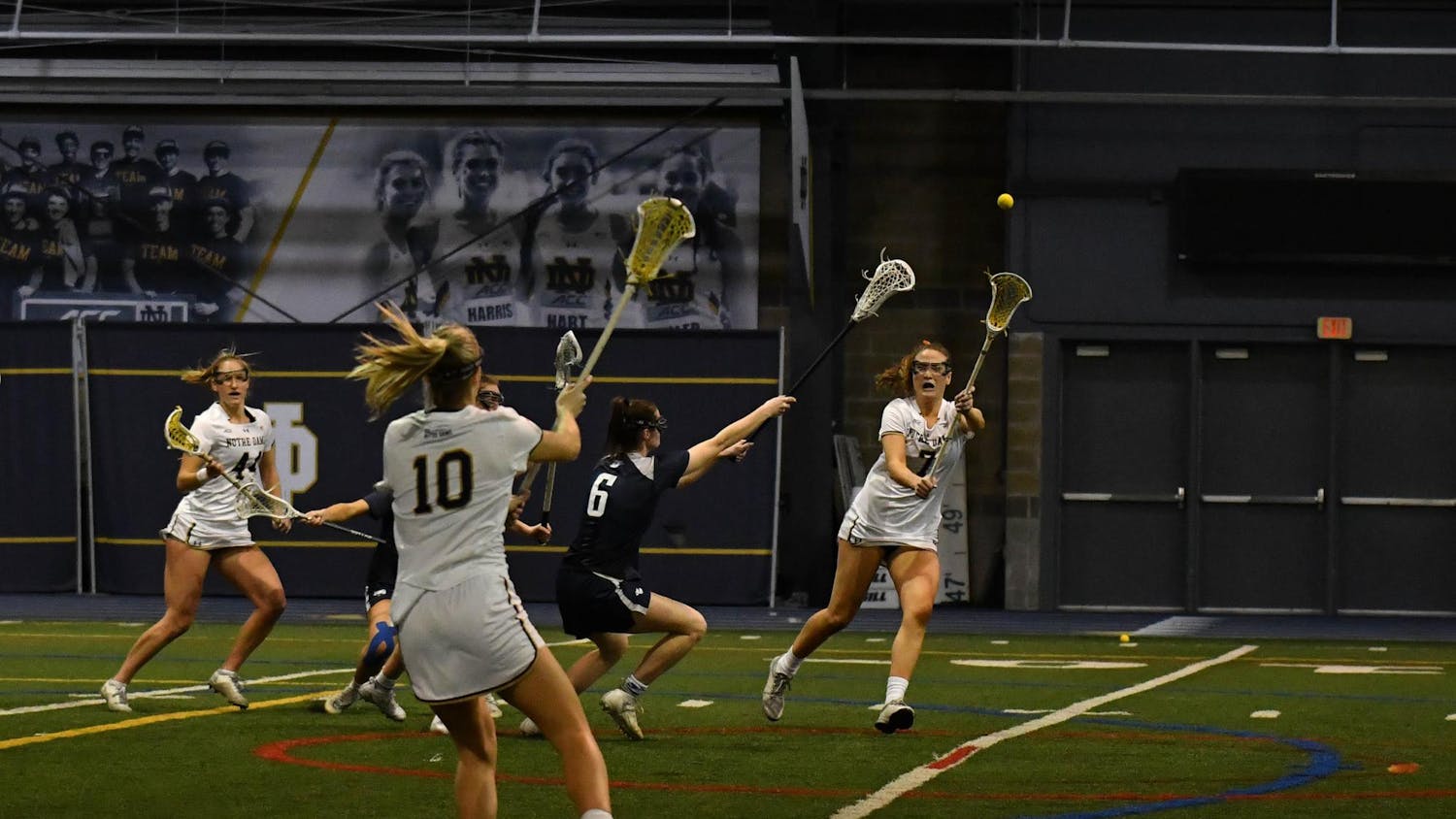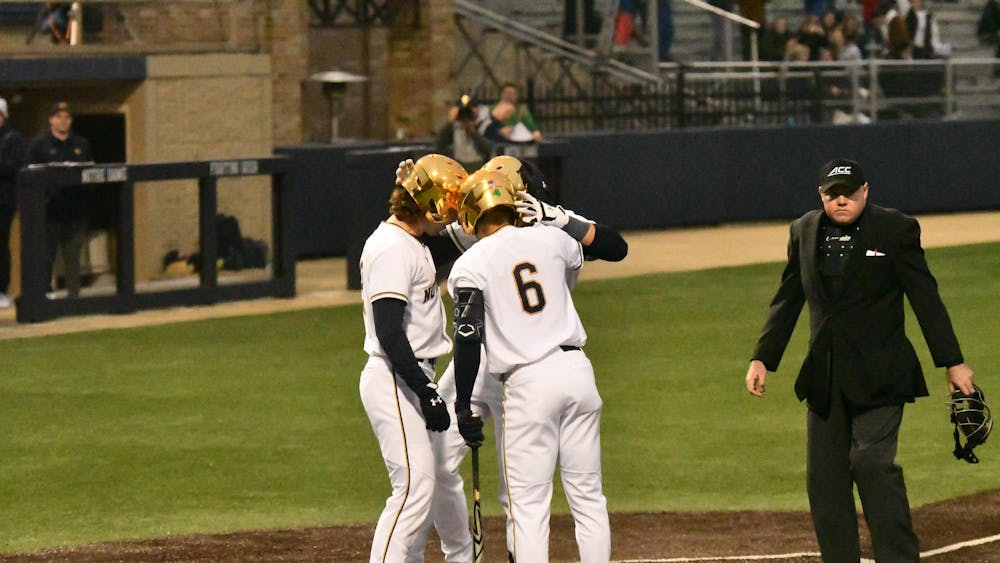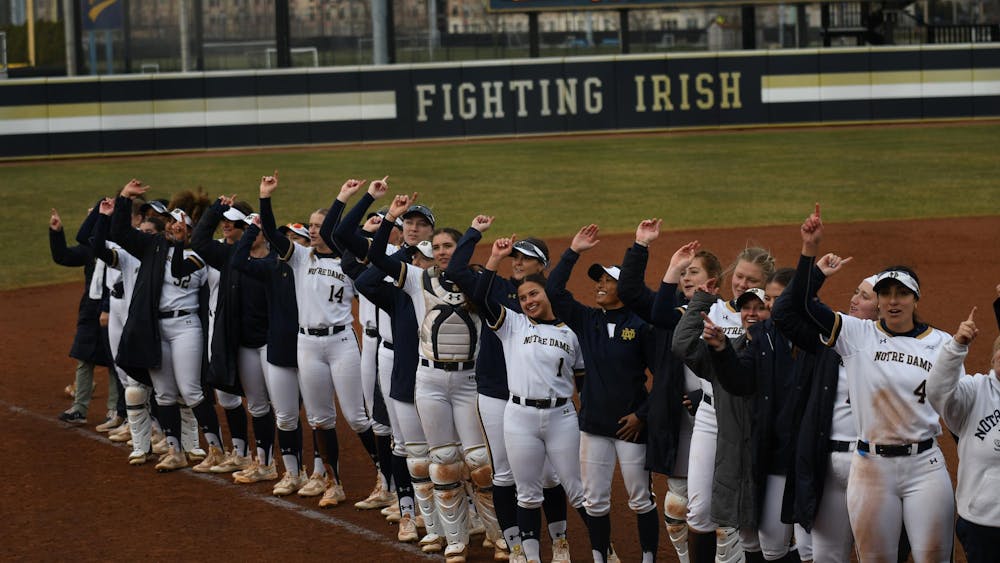Tom Brady was on the opposite sideline. The Wolverines had rings on their fingers. Michigan was a top-five team.

Sound intimidating? Not to quarterback Jarious Jackson, who was starting his first game in the 1998 season opener.
"For me personally, I wasn't thinking of anything they had accomplished in the past," Jackson said in a phone interview with The Observer. "We weren't thinking about ourselves, what we had done in the past. I was pretty much taking it for what it was, every game."
No. 22 Notre Dame responded from a 13-6 halftime deficit to explode for 30 unanswered second-half points and upset No. 5 Michigan 36-20. Jackson did not post impressive numbers, but became the ninth consecutive first-time starter to win his first game.
He completed 4 of 10 passes for 96 yards with two touchdowns and an interception. He also added 16 carries for 62 yards on the ground.
"The only numbers I care about, even to this day as a coach, are wins and losses," Jackson said. "I've always been that way. I didn't care if I threw three touchdowns with three interceptions ... but the biggest stat that I cared about after the game was the fact that we won."
Jackson did, however, provide one of the biggest highlights of the day when he connected with receiver Raki Nelson on a 36-yard score in the third quarter.

On the first play following a Michigan fumble, Jackson faked an option play to the fullback as the offensive line shifted left. Right guard Jerry Wisne accidentally stepped on Jackson, who struggled to keep his balance, stumbling back eight yards before lofting a pass down the left sideline to Nelson. Nelson ran under the ball at 11-yard line with no Wolverines within 10 yards of him.
"I was able to keep my balance and I could still see Raki Nelson," Jackson said. "Even though I was stumbling and bumbling, I still kind of saw Raki. As soon as I came up, I knew guys were going to be there to hit me. I just wanted to get the ball gone as fast as I could and he was able to finish the play."
After the game, some Irish players lifted coach Bob Davie onto their shoulders and carried him to midfield. Jackson said the win was big for not only himself, but also for Davie too.
"Dealing with the rivalry that we've had with Michigan for decades, dealing with the first year without Ron Powlus and some of the other guys that had carried that team for years and years, it was basically just turning over a new leaf," he said. "Whenever a new quarterback steps in, the Notre Dame nation is pretty much holding their breath just not knowing how it's going to unfold. We were able to come out and we were able to make Notre Dame nation proud."
Jackson worked with, among other coaches, Urban Meyer while Meyer was the Notre Dame receivers coach. At the time, the Irish were primarily an option team with bits of the spread offense mixed in as well.
"We ran a number of different offenses and being part of the spread offense is what coach Meyer definitely had his hand in on," Jackson said. "He would work with the quarterbacks as well as the receivers, getting the game plan down. That's when I was able to really take time with coach Meyer and try to learn how to read defenses in regards to the spread offense."
Meyer revolutionized college football with his spread option attack and unique use of mobile quarterbacks. Jackson said his career would have been better if he had exclusively been in Meyer's offense.
"I think I would have been awesome in it, being a mobile quarterback with a lot of arm," he said. "In the short time I was in it, for a while there, I held the Notre Dame single-season passing record. That was before Brady Quinn and a couple other guys came along and started running that caliber of offense for three or four years as compared to me only running it for one.
"I think I would have fared pretty well if that was the system I was in for a longer amount of time."
After his Notre Dame career concluded, Jackson played four seasons with the Denver Broncos before heading north of the border to play in the Canadian Football League (CFL). Jackson played eight seasons in the CFL and won three Grey Cups - two with the BC Lions and one with the Toronto Argonauts. He said the adjustment to the CFL was a difficult one.
"You have to get used to a bigger field and the goalposts being in the front of the end zone and a 12th man being on the field as opposed to 11 and then only having two downs to get a first down as opposed to three," he said. "There were a few adjustments in dealing with that. The game is a lot faster than American football."
He retired in February of this year, capping a career in which he threw for 7,878 yards and 55 touchdowns, to coach the Lions' quarterbacks.
Jackson said the Lions received permission to speak with him about the job and a couple months later, Jackson asked Toronto to release him.
"It was kind of bittersweet," he said. "It was at that point I knew I would have to give up playing and it would be the end of my career. On the good side, though, I'm still part of football, I'm still part of the sport that I love. I get to pass on knowledge and help other guys."
The 2000 marketing graduate said his coaching style is not about teaching his quarterback to throw the ball.
"It's more about giving him the knowledge between the ears," Jackson said. "If he knows where to go with the ball, to me, that's more important than how he throws or how he looks when he throws."
Jackson said he does not have an ultimate coaching destination and is content to be where he is right now.
"If it happens, it happens," he said. "I don't have a set goal, per se, of 'I have to be here or I have to be there.' I'm happy where I am here north of the border. If the opportunity presents itself, it'll be something I have to think about and I'll cross that bridge at that time. I'm in the here and now as far as the BC Lions and the CFL. I can't complain about it."
Jackson, 36, lives in Vancouver and is married with three kids.
Contact Matthew DeFranks at mdefrank@nd.edu












